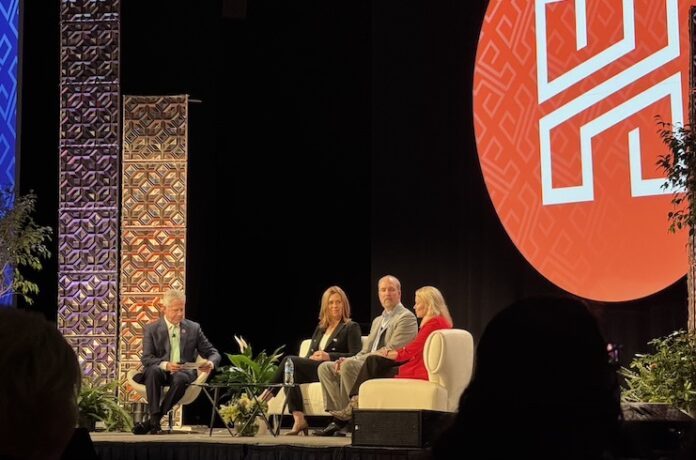
Among the many critical topics discussed at The Hospitality Show 2024 at the Henry B. González Convention Center in San Antonio, Texas, guest experience, workplace culture, and artificial intelligence (AI) remain top themes for franchisors. As the conference kicked off on October 28, a Welcome Session energized attendees with the conference’s second-annual General Manager awards. On October 29, multiple panels, keynotes, and discussions continued the theme, shedding light on leadership insights and providing ample networking opportunities.
In a panel titled “Collaborative Perspectives: Redefining the Commercial Strategy,” Kevin Carey, interim president and CEO, American Hotel & Lodging Association (AHLA), led multiple travel leaders in a panel covering the importance of continually innovating and creating efficient work environments to remain competitive in the market.
Scott Strickland, chief commercial officer, Wyndham Hotels & Resorts, highlighted the necessity of removing friction from both the guest and owner experience. To achieve this, Wyndham “just launched the ability to book air, book your rental car, book your hotel, all on our site,” Strickland said. Enabling the guest experience to be frictionless in turn streamlines the owner experience, Strickland added, because efficiencies like mobile check-in allow owners to best prepare for guests’ arrivals, ultimately leading to labor productivity.
Kristie Goshow, chief commercial officer, KSL Resorts, also underscored the significance of labor productivity, which she noted is a challenge for hotels from a cost perspective. Goshow said, “A huge amount of the new initiatives that you’re going to see coming out of the commercial organization is going to be fully supporting those efficiencies in the heart of the operation because … a lot of technology is being externalized to the guest.” This perspective aligns with the broader theme of leveraging technology to drive efficiency.
Moreover, Goshow noted that KSL engages its leaders in various functions early in their role to ensure worker alignment. She noted that, as a smaller company, collaboration between roles is essential, and wearing multiple hats is key. “We really do encourage that by exposing all members of our commercial team to the broader business, and it also provides opportunities for people in terms of movement within the organization,” she said. This emphasis on cross-function collaboration is crucial for fostering a workforce equipped to navigate the complexities of a modern commercial strategy.
Labor productivity also comes down to hiring the best talent for the roles available. Doreen Burse, senior vice president, worldwide sales, United Airlines, who also has experience working for Marriott, explained that the airline specifically hires and cultivates “talent that actually understands a lot of aspects of the airline, and there’s a variety of ways we do that. Whether it’s recruiting early on at industry events …the best people, generally, have worked in multiple areas of the airline.” Burse also experienced this during her tenure in hotels, and she adds that United Airlines’ talent process is proactive and includes looking at new recruits both from inside and outside of the company.
All panel participants discussed the role of leveraging technology to enhance the travel journey. Strickland specifically mentioned Wyndham Connect and how it helps the company gain insights about its guests, including amenities preferences. Just as important is the post-stay feedback, which generates a relationship between the company and the guest beyond the initial stay.
Goshow reinforced the importance of guest engagement, noting that it should occur “across all channels, not just email.” If a guest prefers to receive a text or have a human reach out instead of a bot, hospitality companies should be able to adapt accordingly. Goshow said “that goes a long way” for communication and personalization of commercial strategies.
Burse, however, emphasized that United Airlines is focused on meeting guests where they are, both before they board the airline and during their journey. That communication is key, and Burse noted that “AI helps with every flight’s story,” specifically mentioning the importance of using technology to update customers about flight delays or tracking luggage from check-in to baggage claim.
Throughout the session, panelists emphasized the importance of innovation, collaboration, and technology to enhance operational efficiency, and, importantly, the overall travel experience, positioning brands and franchisors for success in an increasingly competitive landscape.









